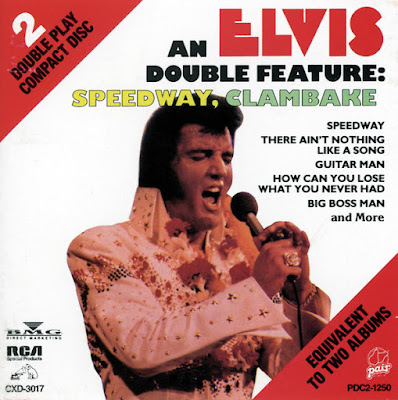 |
| Sold Out! The Ultimate 8 mm Collection Vol.10 features fan footage from 1976–1977. |
The tenth volume in the Sold Out! The Ultimate 8 mm Collection series, featuring 8 mm footage filmed by fans who attended some of his concerts in 1976 and 1977, confirms Elvis deteriorating condition during the last face of his career. But it also shows that Elvis, in periods, could get back in shape, and move around the stage like his old self, delivering solid performances.
His first tour in 1976 is represented by fan-shot footage from Johnson City, March 17 and Charlotte three days later. I especially enjoyed the evening performance in Charlotte, featuring footage in good quality. Granted, Elvis looks a bit heavy in his bicentennial suit, but he sings well and seems to be having a good time.
Maybe he put in a little extra effort due to the fact that he had a new pianist (Shane Keister) and drummer (Larry Londin) with him. Larry Londin can be seen behind his drums, belting away with a smile on his face, clearly enjoying himself. "Good job, man," Elvis tells him after his drum solo during the introductions. And at the end of "Polk Salad Annie," Larry Londin really lets loose on the drums while Elvis throws the mike and does some karate moves. Really cool.
It is also enjoyable to watch Elvis interact with a couple of kids that are lifted up on stage, especially a boy dressed in a home made jumpsuit. "Can he do imitations? Can he sing 'Hound Dog' honey?" Elvis asks the boys mother, then launches himself into the song, urging the boy to sing along, the boy looking up at him, then looking down again, shaking his head at his mother. He was probably shy or scared stiff. But he must have gained courage, as he is back on stage a while later, receiving a scarf and a kiss from Elvis.
 |
| Each volume in the series includes two DVD discs. |
Three months later, Elvis takes the stage in Charleston (July 24), and one week after that, New Haven is on the tour schedule (July 30). Not only does the footage reveal that Elvis has gained more weight, he also moves slower and with less energy. And he sounds tired, exhausted and out of breath, especially on the New Haven concert.
Still, there is no mistaking the excitement flooding through the arena as Elvis enters the stage, with all those flash bulbs going off and a lot of people in the audience screaming at the top of their lungs. And there are some enjoyable moments, like when Elvis hands soprano singer Kathy Westmoreland a scarf at the end of "The Hawaiian Wedding Song." But as a whole, this is one of the weakest concerts with Elvis that I know of.
On October 22, Elvis was captured on super 8 film while performing in Champaign, and the transformation is almost unbelievable. Positive things had obviously started to happen, as he is much leaner and radiates more energy. Also, he moves around a lot more, right from the start during "See See Rider," and his singing reveals a more powerful voice. A great example of this is "You Gave Me A Mountain," a song that is so much stronger than the version from New Haven three months before.
Another great moment is seeing him throw his guitar to Charlie Hodge after the ending of the "I Got A Woman"/"Amen" routine. The footage from Champaign actually reminded me of how Elvis moved and looked during his Pittsburgh concert on New Years Eve two months later. And it certainly helps that he is wearing a new jumpsuit as well, the Inca Gold Leaf suit.
Therefore, it is a bit sad to watch the footage from Tempe (March 23, 1977) and Norman, filmed two days later, revealing that things have gone to worse again. The volume ends on a more positive note, with Elvis' Chicago performance on May 2, 1977, an above average show that year with Elvis in a good mood and voice.
 |
| Content and running time of the tenth volume. |
Releases such as the Sold Out! The Ultimate 8 mm Collection series don't change history. But they do paint a more varied picture of what it was like seeing Elvis on stage during the 1970's, and the tenth volume is no exception. Like I wrote at the beginning of this post, 1976 and 1977 was a downhill slide for Elvis, but watching the super 8 footage it is evident that for short periods of time, he got his act together, looking and performing better.


















